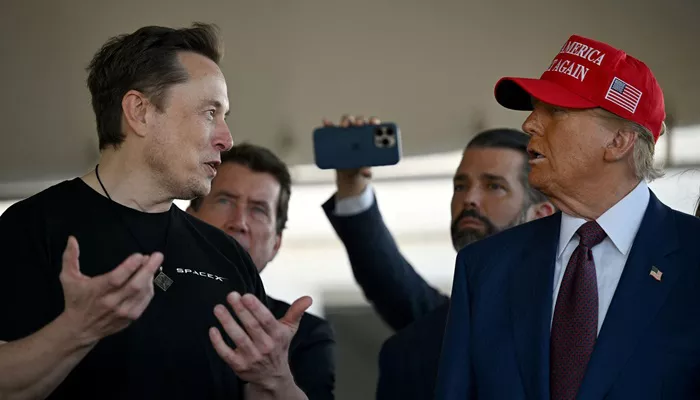Elon Musk, a former ally of President Trump, has launched a scathing attack on Trump’s signature tax reform bill, labeling it a “hideous thing” that poses a threat to the budget. This sharp rebuke has added fuel to the fire, as fiscal hawks within the Republican Party also ramped up their criticism of the massive fiscal package.
Musk’s public condemnation comes at a critical juncture. Trump has been personally lobbying opponents of the bill, and Musk’s remarks have put the tech mogul at odds with the president. Analysts fear that these comments could further intensify resistance and delay the passage of the bill, which aims to cut taxes and raise the debt ceiling.
“This huge, outrageous and politically corrupt congressional spending bill is disgusting. Those who voted for it are disgraceful,” Musk wrote on social media. His criticism follows his recent departure from a temporary role in the government efficiency department’s federal spending cut plan. Musk’s high – profile involvement in the Trump administration has reportedly damaged his business brand, with a significant plunge in sales of his company’s electric vehicles.
Diverging Views Among Republicans
White House Press Secretary Karoline Leavitt dismissed Musk’s criticism. “The president is already aware of Elon Musk’s position on this bill. This will not change the president’s view. This is a huge and beautiful bill, and he stands by his position,” she told reporters on Tuesday.
Republican fiscal hawk and Utah Senator Mike Lee seemed to echo Musk’s concerns, highlighting the potential complications that Musk’s public stance could bring to the bill’s passage. In response to Musk’s post, Lee said, “The Senate must make this bill better.”
House Speaker Mike Johnson called Musk’s criticism “very disappointing,” while Treasury Secretary Bizenet threw his support behind the bill. After meeting with Senate Majority Leader John Thune on Tuesday, he stated, “This is a very beautiful big bill.”
Financial Implications of the Tax Bill
The tax bill passed by the House of Representatives is projected to reduce federal revenue by approximately $4 trillion over a decade. Even with hundreds of billions of dollars cut from safety net programs such as Medicaid and food stamps, it is still expected to increase the federal deficit by around $2.5 trillion during this period.
The measure also includes the gradual phasing out of tax incentives for electric vehicle purchases and clean energy production introduced during the Biden era. Tesla has voiced its opposition to these changes. “Sudden termination of energy tax credits will threaten the energy independence of the United States and the reliability of the power grid,” Tesla Energy, the solar and battery – focused division of Tesla, wrote on social media. Musk himself later shared the news on social media.
Previous Disagreements and Ongoing Debates
Musk has also publicly differed with Trump on the issue of tariffs. During Tesla’s earnings call in April, he told investors that he would advocate for “lowering tariffs rather than raising them.”
Trump’s push for the tax and spending plans has not been without friction within the party. Earlier on Tuesday, Trump called fiscal conservative Rand Paul a “nut job” as he pressured Republican senators who oppose the plans. Paul, a senator from Kentucky, said he would not vote for the legislation due to its debt – ceiling – raising provisions. “I don’t think that’s the right thing to do. It’s not a conservative approach,” he said, adding that he believed the tax measures would overly increase the national debt.
Trump responded on social media, calling the senator “a loser” with “crazy ideas.” Paul later countered, stating that he supported tax cuts but wanted the $5 trillion in new debt removed from the bill. He also claimed that at least three other Republican senators agreed with him, which could potentially block the legislation.
Path Forward and Debt Ceiling Crisis
Senate Majority Leader John Thune emphasized the necessity of raising the debt ceiling, stating, “Failure is not an option.” The US Treasury Department estimates that the United States will exhaust its borrowing authority in August or September.
Thune acknowledged the challenge of reconciling the conflicting demands of the 53 Republican senators and crafting a plan acceptable to a majority of the 100 senators. All Democrats are expected to oppose the legislation. “We must reach 51 votes, so we will figure out the way forward to achieve this goal in the coming weeks,” Thune told reporters.
According to sources, Trump plans to meet with Republican members of the Senate Finance Committee at the White House on Wednesday to discuss legislative issues. While most outside economists predict that the House – passed legislation will increase the US debt by trillions of dollars over 10 years, the White House contends that the tax bill will recoup some of the costs through economic growth.
Trump and Republican leaders argue that including the debt ceiling in the tax bill is a necessary step to ensure its passage and avoid a potential payment default as early as August.
Related topics:

